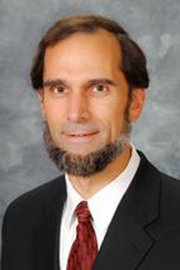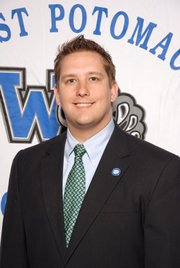Mount Vernon High School principal Nardos King tests out the school’s new turf field, dedicated last week in honor of community leader Jeff Todd. Photo courtesy of Nardos King
The first day of school may represent a fresh start for students, parents and teachers, but there are a number of ongoing challenges facing schools in Mount Vernon. For School Board member Dan Storck, the new school year is a reminder that these haven’t gone away.
One of the major issues Storck continues to see is the percentage of students in the Mount Vernon district that are “needy, financially and academically,” he said. “Those families are riskier families, to make sure kids are ready for school to start with.”
For the 2014-2015 school year, the U.S. Department of Agriculture recognizes families with annual incomes at 185 percent of the poverty level as economically disadvantaged and eligible for free or reduced breakfast and lunch at school.
According to Storck approximately 28 percent of the population across Fairfax County falls into this category. In Mount Vernon, that number rises to about 36 percent. And that has a significant impact on schools, top to bottom.
“If we don’t ensure and help and assist the academically less stable kids,” said Storck, “that has an effect on all the kids. We need additional resources to help these kids be successful. In general, we spend approximately 50 percent more resources on students who speak other languages, or are economically disadvantaged.”
This problem has been compounded by the changes taking place in the Virginia Standards of Learning (SOL) exams over the past several years. As the tests have become more mastery learning expectation-based rather than core comprehension minimums, Storck said they’ve seen more and more students not passing.
Part of that outcome is teachers needing to adapt and change curriculums and principals addressing any development support their teachers might need.
But findings from a study recently released by Longwood University economics professor David Lehr strongly correlate ethnicity and family income across 1,100 Virginia elementary schools with success levels on the SOL tests.
Storck said one of the biggest changes this year he’s optimistic will improve the situation is the end of early Mondays.
“By eliminating early Monday closing this year, we provide kids with 75 more hours of instruction a year, out of almost 1,000 a year,” he said. That goes a long way to make up for the additional required resources he mentioned earlier. “We know especially the neediest will benefit most.”
He’s also enthusiastic that having the extra time in the schedule will make sure each student gets a full recess every day. It’s those times, Storck said, where students can learn central life skills that can’t be taught in the classroom.
“You learn how to cooperate, support each other,” he said. “When somebody pushes you down, you get back up. You learn a lot of that by free play — how to deal with that without an adult standing right there.”
At Mount Vernon High School, nine-year veteran principal Nardos King saw immediate effects from the changing SOL tests, especially in math. “In the 2011-2012 school year,” she said, “scores dropped from 85 to 53 percent. SOLs don’t always reflect the progress in the classroom, but it is a gauging point for us. We had to build those skills back up.”
Immediately King brought in an instructional math coach to help teachers gather and assess data, and figure out where to refocus. The results have been so encouraging — last year’s scores improved by 11 percent — that King now has an instructional coach advising teachers in all four core subject areas. “Being able to provide my teachers a resource, assist them, is something I can do, and I’m able to pull the staffing to do,” she said.
STORCK’S CONTINUING concerns and hopes aren’t limited to the disadvantaged population. Also on his radar are high school start times — he thinks they’re too early — a trend of flat county school budgets over the last half decade, below average compensation for teachers compared with neighboring areas, improving the health of school lunches and overcrowding.
This fall a series of town meetings throughout Mount Vernon and Lee District will provide a forum for community members to have a dialogue on how to address overcrowding issues.
West Potomac High School fits right into that category. According to second-year principal Alex Case, last year’s student body of 2,300 ballooned to 2,481 including new registrations on the first day of school. There are already 10 trailer classrooms set up behind the school.
Beyond the physical space constraints, Case said the overcrowding also stretches the school’s resources to “make every kid successful. It was a weakness last year,” he said, emphasizing graduation, attendance and family support. “Sometimes we don’t have all of our ducks in a row in terms of catching every kid.”
As part of their 2014-2015 school year motto “World’s Greatest High School,” Case plans to implement an on-time graduation program, as well as encourage more students to take one or more of the 27 Advanced Placement courses on offer.
“It’s a mentality, a reality of the school,” said Case. “Are we being the world’s greatest versions of ourselves as teachers, students, parents? What you say, act, believe is what comes out. It becomes your values.”


